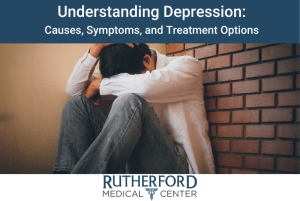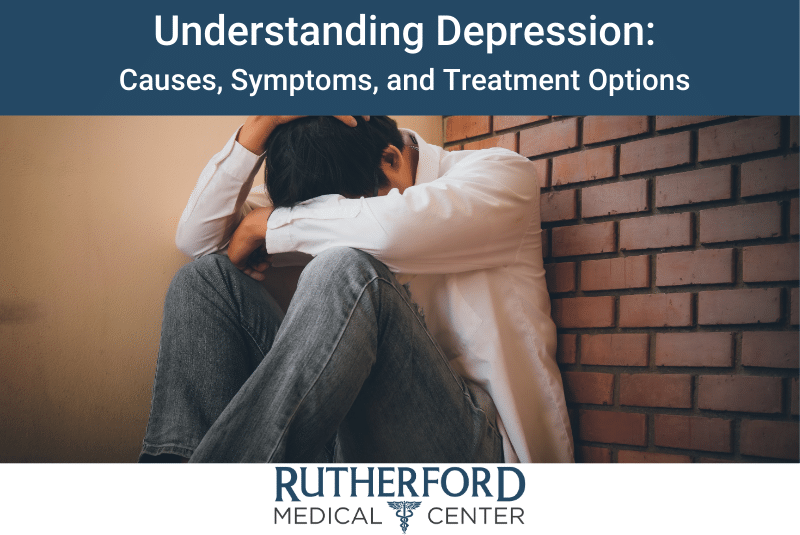February 1, 2025
 Depression is more than just feeling sad or having a bad day. It is a serious medical condition that affects how a person feels, thinks, and acts. While it is common for people to experience occasional sadness, depression can become debilitating if left untreated, affecting a person’s ability to function in daily life. At Rutherford Medical Center, we recognize the importance of mental health and are here to provide support and treatment for those struggling with depression.
Depression is more than just feeling sad or having a bad day. It is a serious medical condition that affects how a person feels, thinks, and acts. While it is common for people to experience occasional sadness, depression can become debilitating if left untreated, affecting a person’s ability to function in daily life. At Rutherford Medical Center, we recognize the importance of mental health and are here to provide support and treatment for those struggling with depression.
What Is Depression?
Depression, also known as major depressive disorder (MDD), is a mood disorder that causes persistent feelings of sadness, hopelessness, and a lack of interest in activities. It can interfere with a person’s ability to work, sleep, eat, and enjoy life. Depression is not simply a weakness or something that can be “snapped out of”; it is a medical condition that requires understanding, compassion, and treatment.
Common Symptoms of Depression
The symptoms of depression vary from person to person, but common indicators include:
- Persistent sadness or emptiness
- Loss of interest in hobbies or activities
- Fatigue or lack of energy
- Changes in appetite or weight
- Difficulty sleeping or sleeping too much
- Feelings of worthlessness or excessive guilt
- Trouble concentrating or making decisions
- Irritability or restlessness
- Physical aches or pains without a clear cause
- Thoughts of death or suicide
Causes of Depression
Depression is a complex disorder that can stem from a variety of factors, including:
- Biological Factors: Imbalances in brain chemicals (neurotransmitters) like serotonin, dopamine, and norepinephrine can contribute to depression.
- Genetic Factors: Individuals with a family history of depression may be more likely to experience the disorder.
- Environmental Factors: Stressful life events, trauma, abuse, or loss can trigger or worsen depression.
- Medical Conditions: Chronic illnesses such as heart disease, diabetes, or cancer are often linked to depression.
- Substance Abuse: Alcohol or drug use can exacerbate or lead to depressive episodes.
Types of Depression
There are several forms of depression, including:
- Major Depression: Characterized by severe symptoms that interfere with daily life and occur most days for at least two weeks.
- Persistent Depressive Disorder (Dysthymia): A chronic form of depression with milder symptoms that last for at least two years.
- Bipolar Disorder: Also known as manic-depressive illness, this disorder includes periods of depression alternating with periods of elevated mood (mania).
- Postpartum Depression: This occurs in some women after childbirth and includes feelings of sadness, anxiety, and exhaustion.
- Seasonal Affective Disorder (SAD): A form of depression that occurs seasonally, typically in the winter months when there is less sunlight.
Treatment Options
At Rutherford Medical Center, we offer comprehensive treatment plans tailored to each patient’s unique needs. Treatment for depression may include:
- Therapy: Psychotherapy, or “talk therapy,” helps individuals manage their depression by exploring thoughts, feelings, and behaviors. Cognitive-behavioral therapy (CBT) is a common approach that focuses on changing negative thinking patterns.
- Medication: Antidepressants such as selective serotonin reuptake inhibitors (SSRIs) and serotonin-norepinephrine reuptake inhibitors (SNRIs) can help restore balance to brain chemicals.
- Lifestyle Changes: Regular exercise, a balanced diet, proper sleep, and stress management can all contribute to improved mental health.
- Holistic Treatments: Rutherford Medical Center offers holistic approaches such as mindfulness practices, meditation, and yoga to complement traditional therapies.
- Support Groups: Joining a support group can provide individuals with the encouragement and understanding they need from others experiencing similar struggles.
When to Seek Help
If you or someone you know is experiencing symptoms of depression, it is essential to seek professional help as soon as possible. Depression is a treatable condition, and early intervention can prevent symptoms from worsening.
Comprehensive Q&A Section
Q: How is depression diagnosed?
A: Depression is typically diagnosed through a combination of a medical history, physical exam, and a psychological evaluation. A doctor may ask about your symptoms, lifestyle, and family history to determine the best course of action.
Q: Is depression more common in women than in men?
A: Yes, studies show that women are more likely to experience depression than men, although men are more likely to suffer from undiagnosed depression or not seek help due to societal pressures.
Q: Can children experience depression?
A: Absolutely. Depression can affect people of all ages, including children and teenagers. In younger individuals, it may manifest as irritability, changes in appetite, or difficulty in school.
Q: How long does it take to recover from depression?
A: Recovery time varies from person to person. Some individuals may start feeling better within a few weeks of treatment, while others may require several months or longer. Consistency in therapy and medication can lead to successful outcomes.
Q: Can depression go away on its own?
A: While some people may experience short-lived depressive episodes, depression typically requires treatment to prevent it from worsening or recurring. Without intervention, symptoms may persist or escalate.
Q: Are there any natural remedies for depression?
A: Some individuals find relief through lifestyle changes like exercise, a healthy diet, and mindfulness practices. However, these methods should not replace professional treatment and should be used as complementary approaches.
Q: What should I do if I have suicidal thoughts?
A: If you are experiencing suicidal thoughts, seek immediate help. Contact your local emergency services, go to the nearest emergency room, or reach out to a trusted friend or family member. Rutherford Medical Center provides emergency services for mental health crises.
Contact Information
At Rutherford Medical Center, we are dedicated to helping individuals overcome depression and reclaim their lives. If you or a loved one is struggling with depression, we encourage you to reach out to us for compassionate care and support.
Rutherford Medical Center
12755 Century Dr, Suite A
Don’t hesitate to contact us today to schedule an appointment or learn more about our mental health services.
By seeking help, you are taking the first step toward healing and recovery. At Rutherford Medical Center, we are with you every step of the way.
